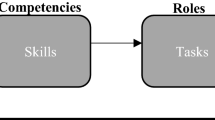Abstract
Guided by program goals and faculty feedback, this paper aims to examine best practices for a hybrid faculty development certificate program. Researchers evaluated outcome measures and report faculty responses in an effort to add to the literature on this topic and to provide a model for institutions of higher learning.
Access this chapter
Tax calculation will be finalised at checkout
Purchases are for personal use only
Similar content being viewed by others
References
Horvitz, B., Beach, S.: Professional development to support online learning. J. Fac. Dev. 25, 24–32 (2011)
Abdou, M.: A process-oriented framework for acquiring online teaching competencies. J. Comput. High. Educ. 23, 60–77 (2011)
Barker, A.: Faculty development for teaching online: educational and technological issues. J. Contin. Educ. Nurs. 34(6) (2003)
Bell, F.: Connectivism: It’s place in theory-reformed research and innovation in technology-enabled learning. Int. Rev. Res. 2(3) (2011)
Storandt, B., Dossin, L., Lacher, A.: Toward an understanding of what works in professional development for online instructors. J. Asynchronous Learn. Netw. 16(2), 121–162 (2012)
Koepke, K., O’Brien, A.: Advancing pedagogy: evidence for the role of online instructor training in improved pedagogical practices. J. Asynchronous Learn. Netw. 16(2), 73–83 (2012)
Lee, D., Paulus, T., Loboda, I., Phipps, G., Wyatt, T., Myers, C., Mixer, S.: A faculty development program for nurse educators learning to teach online. Tech. Trends 54(6), 20–28 (2010)
Johnson, T., Wisniewski, M., Kuhlemeyer, G., Isaacs, G., Krzykowski, J.: Technology adoption in higher education: overcoming anxiety through faculty bootcamp. J. Asynchronous Learn. Netw. 16(2), 63–72 (2012)
Author information
Authors and Affiliations
Corresponding author
Editor information
Editors and Affiliations
Rights and permissions
Copyright information
© 2017 Springer International Publishing AG
About this paper
Cite this paper
Shockley, E.T., Fotiyeva, I. (2017). Best Practices in Distance Education: An Investigation of a Hybrid Faculty Development Program. In: Rocha, Á., Serrhini, M., Felgueiras, C. (eds) Europe and MENA Cooperation Advances in Information and Communication Technologies. Advances in Intelligent Systems and Computing, vol 520. Springer, Cham. https://doi.org/10.1007/978-3-319-46568-5_6
Download citation
DOI: https://doi.org/10.1007/978-3-319-46568-5_6
Published:
Publisher Name: Springer, Cham
Print ISBN: 978-3-319-46567-8
Online ISBN: 978-3-319-46568-5
eBook Packages: EngineeringEngineering (R0)




